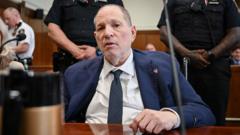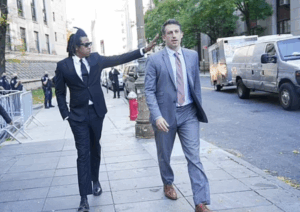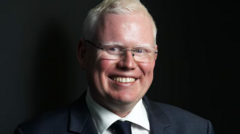The latest developments in Harvey Weinstein's ongoing legal battles have resulted in a mistrial declared by a New York judge due to one juror's refusal to continue deliberations regarding a rape charge from an alleged attack in 2013. The case highlights persistent jury tensions and the complications surrounding Weinstein's previous convictions.
Mistrial in Weinstein Case Following Juror Discontent

Mistrial in Weinstein Case Following Juror Discontent
A New York judge has declared a mistrial in Harvey Weinstein's case amid tensions among jurors deliberating over a rape charge from 2013, signaling another potential trial for the disgraced producer.
In a dramatic turn within Harvey Weinstein's latest sex crimes trial, a New York judge has declared a mistrial concerning a 2013 rape charge after a juror expressed unwillingness to continue deliberations. This development arose from allegations made by actress Jessica Mann, who has vowed to testify again if necessary. The jury's previous deliberations resulted in a mixed verdict, convicting Weinstein of one count of sexual assault while acquitting him of another charge.
An immediate response from Manhattan District Attorney Alvin Bragg confirmed intentions to retry the rape charge, marking a potentially third trial for Weinstein in New York. The day of mistrial announcement coincided with tensions among the jurors that had escalated throughout their six-day deliberation process. Reports indicated that the jury foreperson had communicated concerns about verbal confrontations occurring among jurors, leading to an atmosphere of intimidation.
Following an initial guilty verdict for sexual assault against a different accuser, the jury's choice to acquit on other claims fueled uncertainty on how jurors weighed accusations related to Weinstein's extensive history. In total, Harvey Weinstein faces over 100 allegations of sexual misconduct, assault, and rape, casting a lengthy shadow over his legacy as a prominent Hollywood figure.
Weinstein’s representation has criticized what they describe as "gross juror misconduct" and remained hopeful for subsequent verdicts to be overturned. Meanwhile, the 73-year-old has encountered additional health struggles, receiving treatment during the trial rather than incarceration. As the legal saga unfolds, the implications extend beyond Weinstein himself, highlighting broader issues of accountability within entertainment industries regarding sexual violence.
An immediate response from Manhattan District Attorney Alvin Bragg confirmed intentions to retry the rape charge, marking a potentially third trial for Weinstein in New York. The day of mistrial announcement coincided with tensions among the jurors that had escalated throughout their six-day deliberation process. Reports indicated that the jury foreperson had communicated concerns about verbal confrontations occurring among jurors, leading to an atmosphere of intimidation.
Following an initial guilty verdict for sexual assault against a different accuser, the jury's choice to acquit on other claims fueled uncertainty on how jurors weighed accusations related to Weinstein's extensive history. In total, Harvey Weinstein faces over 100 allegations of sexual misconduct, assault, and rape, casting a lengthy shadow over his legacy as a prominent Hollywood figure.
Weinstein’s representation has criticized what they describe as "gross juror misconduct" and remained hopeful for subsequent verdicts to be overturned. Meanwhile, the 73-year-old has encountered additional health struggles, receiving treatment during the trial rather than incarceration. As the legal saga unfolds, the implications extend beyond Weinstein himself, highlighting broader issues of accountability within entertainment industries regarding sexual violence.



















